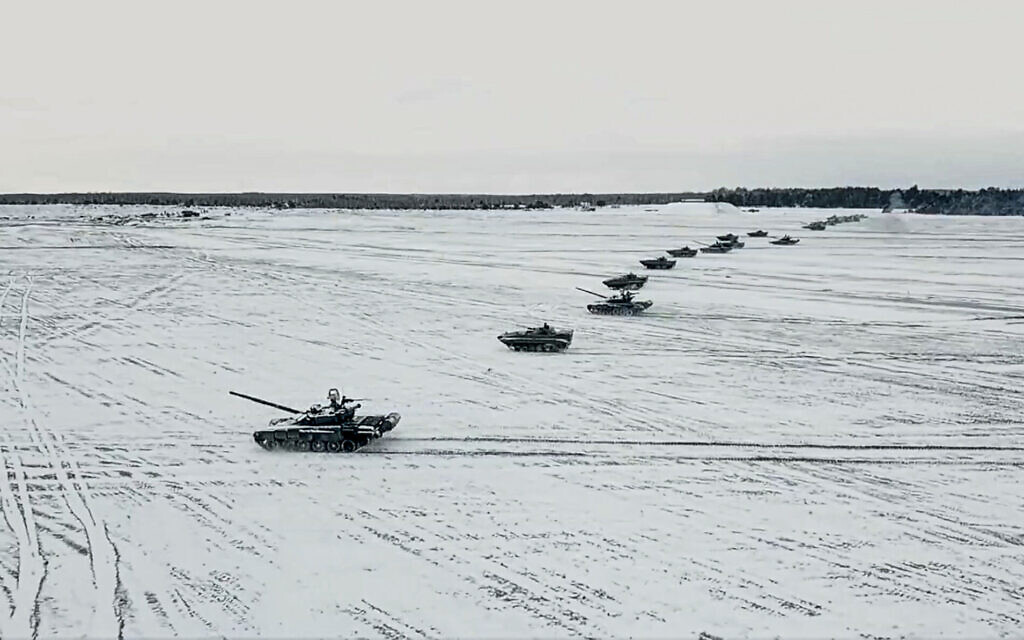
In this photo taken from video and released by the Russian Defense Ministry Press Service on Friday, Feb. 4, 2022, tanks and armored vehicles move during the Belarusian and Russian joint military drills at Brestsky firing range, Belarus. (Russian Defense Ministry Press Service via AP, File)
There have been several theories and muted responses to how to manage the Russian attack on Ukraine, but to this point the people of Ukraine have been mostly failed by the international community. Without truly committing to an effective plan of action, or delaying vital responses with full knowledge of the consequences, Ukraine has been effectively given to the winds.
Ukrainian leadership have been voicing a consistent message to us since well before this recent conflict, being met with deafening silence. When Malaysian Airlines Flight 17 was shot down over Ukraine by what was thought to be a BUK-M1 missile system in 2014, the victims were mostly ignored by the rest of the world after a few weeks. An incident like having an airliner full of innocents being destroyed would have contributed to the end of a regime as it did in the past with Korean Airlines Flight 007, but now victim’s families of Malaysian Airlines Flight 17 and Ukraine International Flight 752 need to beg for the most basic application of justice, and are ignored in many cases by their own Government.
Following the details of how assistance to Ukraine is being applied, International Lawyer Mark Warner has shared information demonstrating that some of the aid is limited. It could be the case that due to the interests of some in power, aid is restrained to the point of being knowingly ineffective. Sanctions being put in by banks often ignore funds related to Russian oil and gas production. In a callous move, Russian oil and gas bans have been applied to crude oil that is not currently being imported, but ignore refined products that are still flowing to nations worldwide.
Oil and gas is the industry that runs money to Russia’s power elite, and as a result fuels the military with political leverage, petrol and ammunition. Effectively, each litre of gas you put in your tank is like giving a handful of bullets to a Russian soldier in Ukraine. The continued limitation of other oil producing nations in ignoring their ability to displace Russian fuel and dilute Russian leverage contributes greatly to the conflict at this very moment. Every delay in limiting the conflict results in lives lost.
The initial attack on Ukraine was done using common modern techniques, with cruise missiles and air to surface missile systems targeting Ukraine’s Air assets and their Air Defence network. Despite much bravado from international experts claiming the superiority of Russia’s military, much of Russia’s experience was based on using high tech missile systems and air power in Syria. Ground force operations were mostly clouded by their several difficult on the ground missions in Chechnya, many that were lost until the Russian Armed Forced decided to raze Grozny to the ground on their third major attempt. While more complex anti-tank equipment is making a great difference in the battles in Ukraine presently, they still lack many of the systems they have been asking for well before this conflict began. As has been pointed out by Ukraine’s leadership, they not only need ammunition, they need certain types of systems to stand up to Putin.
In this situation, the financial sanctions and displacement of Russian finances need to not only be done in a meaningful way, but rapidly. Delays are tantamount to death in the current siege of Ukraine, and masking real help with virtue is as bad as not helping at all.
To manage the threat of Russian Armour by inexperienced soldiers or average citizens, the anti-tank systems given to people need to be simple to use and effective. Advanced NATO systems will not be easily used by those without experience, and RPG-7 or other simple systems need to be sent to Ukraine to help over the next few days.
While Stinger and SA-7/SA-14 shoulder launched MANPADS are being used in Ukraine right now against air threats, they are not wholly effective against the protection of the SU-25 ground attack aircraft, faster attack aircraft and standard countermeasures. Shoulder launched missiles cannot stop long range missiles like the OKA or Iskander missiles that are being used to target Ukraine’s defenses. Systems like the 2S6 Tunguska and TOR-M1 and NATO systems like the Roland and the Patriot systems are what is needed desperately in Ukraine at this very moment. None of the coming supplies seem to address this crucial need, and with so many delays in supplying Ukraine’s Armed Forces with lethal weapons while ground is being lost, there is little chance that Russia’s Armed Forces would allow the transfer of those critical weapons systems to the front.
The lack of assistance to Ukraine over the period from 2014 until 2021 is notable, as it demonstrates the clear and present ignorance on foreign policy issues of those outside of Eastern Europe. The knowledge of the coming war in 2022 was at no point met with enough physical assistance in effectively blunting an attack, and initially rode on a narrative of hopelessness as an excuse for absent policy. Despite the knowledge and experience from countries like Poland in assisting Ukraine’s defense posture and the incredible aid given to Ukrainians fleeing the violence, intended delays and crumbs of assistance from those outside of the region has not reflected the language coming from average citizens all over the world claiming their support for the Ukrainian people. With so little attention acknowledging other human rights atrocities in the last few years, future generations will surely not look kindly on us.